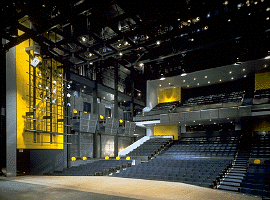









Go
to ticket
price Go
to Bucky
Show information For information on parking, directions, where to eat near the theater, and other logistics, visit the Foghouse Social Director. |
|
The Project Artaud Theater, formerly Theater Artaud, entrance is in the middle of the block, next to A Traveling Jewish Theater entrance on the east side of the Project Artaud building, which occupies the entire square block. Project Artaud is a pioneering arts complex in San Francisco's Mission District. Founded in 1971 by a group of artists and bohemians, it is now one of the oldest member run non-profit live/work institutions in the country. Project Artaud provides live/work space as well as public performance and exhibition space, and houses Southern Exposure Gallery, A Traveling Jewish Theater, Theater of Yugen and Project Artaud Theater.
Project
Artaud members founded the now defunct Theater Artaud. In the
wake of Theater Artaud's recent financial demise, Project Artaud
has once again resumed stewardship of the space, which exists
to support and
nurture innovative performing artists by presenting projects diverse
in discipline and culture,
and providing a versatile,
flexible performance space conducive to the development
Intiman
Theatre
The Intiman Theatre is one of Seattle’s premiere performing arts companies. Founded nearly thirty years ago, Intiman produces both world classics and contemporary plays in a renovated performance space at the Seattle Center, the cultural heart of Seattle, and provides an artistic home for innovative directors, writers, designers and performers. Intiman’s central values-a commitment to language and the exploration of enduring and universal themes, a conviction that theatre is a forum for ideas and a continuing dialogue between artist and audience, and a belief that art reflects and illuminates the experiences of a diverse society-are the core of the Theatre’s mission, programming and extensive civic- and community-based activities. What's
the Seating Like?
The Mercury Theater is one of Chicago's newest commercial theater venues. The intimate 299-seat theater houses a variety of theatrical entertainment, including Broadway touring companies, local theater productions, music and dance showcases, as well as late night series and children's theater. Since opening in February of 1996, the Mercury Theater has received nothing but high accolades from all the major news media including the Chicago Tribune, the Sun-Times, ABC, NBC, and Fox 32, just to name a few. The building in which the Mercury is housed was known as the Blaine Nickelodeon in 1913. Since then, it has housed a variety of different businesses from a carpet cleaning factory to a clothing department store. When the current owners purchased the building, they decided to revert the space to a place of entertainment not only for the neighborhood, but for the Chicagoland area.
The theater, designed by Lisec and Biederman, combines contemporary elegance with a classical flavor. The designers chose to use a continental style seating (no center aisle) and chose to restore theater seats that were found in a 1933 vaudeville house in Boston. Most of the seats are on the main floor, plus a few rows in the balcony. The seats are comfortable and the acoustics are excellent. In the sides of the balcony, some seats are sold as "obstructed view" because there is a railing that you look over. (It's not really in the way - the balcony seats sit higher up so you can see over it.) And some seats on the right balcony are obstructed for the few moments when the actor is downstage behind a work table. The box office staff will discuss this with anyone purchasing obstructed view tickets. View Seating Chart for the Mercury Theater Yerba
Buena Center for the Arts Yerba Buena’s state-of-the-art theater opened in 1993, as part of the Yerba Buena Center for the Arts. The 757-seat theater, designed by American architect James Stewart Polshek, has all the advantages you’d want in a new facility: excellent sound, modern equipment, comfy seats, ample legroom, good sightlines. There is coat-check off the lobby, and concessions on the level above the theater lobby. Theater seating is divided into three sections: To see the YBC seating chart, click here. Los
Angeles Theater Center The Los Angeles Theater Center is housed in former bank building, designed in 1916. As you enter the lobby, it still has the grand feeling of the high ceiling banking hall. The center houses four different theaters. Culture Clash will be presented in Theater 3, a 320-seat house with a thrust stage. The seats are very steeply raked, so sightlines are good and acoustics are excellent. All of the seats are on the same level (there is no balcony). Theater seating
is divided into five sections: Lorraine
Hansberry Theater The Lorraine Hansberry Theater is an intimate space with 298 seats. The theater shares a lovely lobby with the Sheehan Hotel, which was initially built as a YWCA. The Hansberry has two sections: the Orchestra and Mezzanine, which is simply higher up in the house. (It does not overhang the orchestra.) Tall people should avoid the front row of the mezzanine, as it has less legroom than other rows. View Seating Chart for the Lorraine Hansberry Theater
|
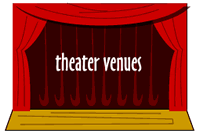

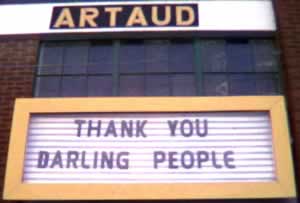 The
building dates to 1925, when it was a functioning factory for
the American Can Company. During World War II, the site of the
theater was used to build airplane parts. The building was later
abandoned, until
a group of visionary
artists decided to occupy and convert the factory. They named
the building Project Artaud
after
French playwright Antonin Artaud, who believed art should happen
in non-traditional spaces. Years later Project Artaud members
helped craft the first live/work codes for San Francisco.
The
building dates to 1925, when it was a functioning factory for
the American Can Company. During World War II, the site of the
theater was used to build airplane parts. The building was later
abandoned, until
a group of visionary
artists decided to occupy and convert the factory. They named
the building Project Artaud
after
French playwright Antonin Artaud, who believed art should happen
in non-traditional spaces. Years later Project Artaud members
helped craft the first live/work codes for San Francisco.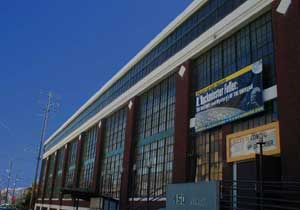 of new work and its audiences.
of new work and its audiences.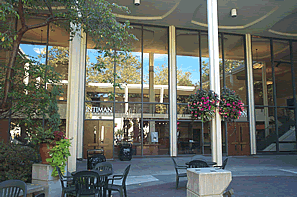 The
Intiman Playhouse is on the northwest corner of Seattle Center.
The Theatre is between the Pacific Northwest Ballet and the Seattle
Repertory Theatre at the 2nd Avenue North and Mercer Street entrance
to Seattle Center.
The
Intiman Playhouse is on the northwest corner of Seattle Center.
The Theatre is between the Pacific Northwest Ballet and the Seattle
Repertory Theatre at the 2nd Avenue North and Mercer Street entrance
to Seattle Center. 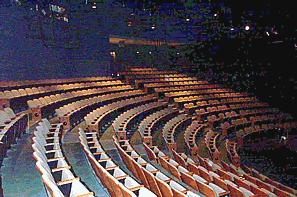
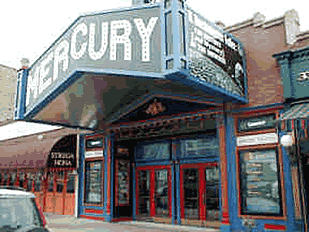 Mercury
Theater
Mercury
Theater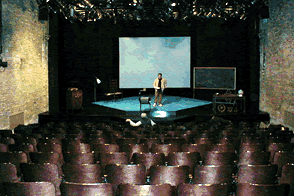 What's
the Seating Like?
What's
the Seating Like? 